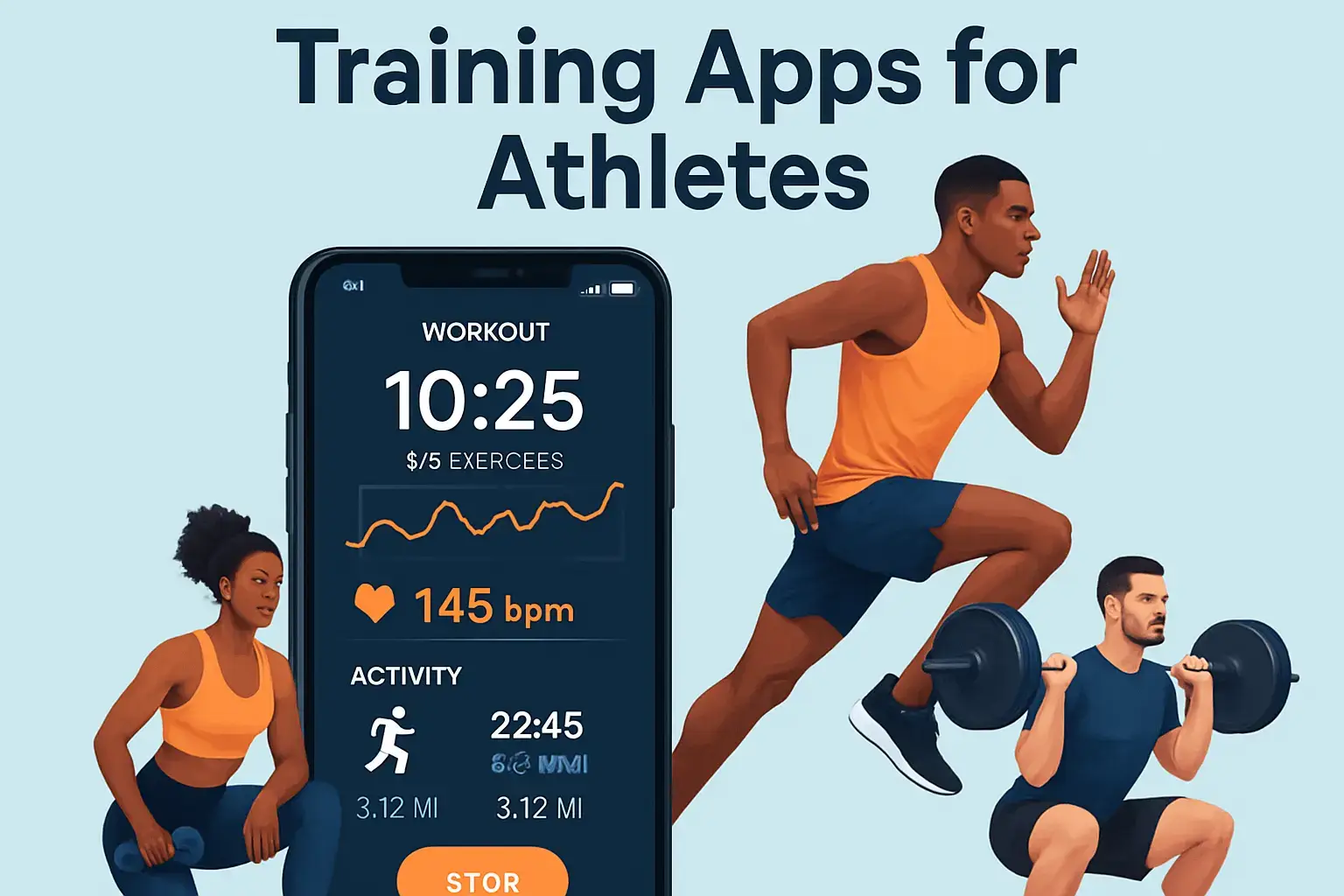Best Training Apps for Athletes: Top Fitness Solutions for 2025
Introduction: The Digital Revolution in Athletic Training
This article explores the top-rated training apps for athletes available this year, examining their unique features, benefits, and limitations. Whether you’re a runner seeking to improve your pace, a strength athlete looking to break personal records, or a team sport player aiming to enhance sport-specific skills, we’ll help you identify the ideal digital training partner to elevate your performance.
Why Athletes Need Specialized Training Apps
While general fitness apps serve the casual exerciser well, serious athletes require more sophisticated tools that address their specific needs. The best training apps for athletes differentiate themselves through several key characteristics:
Data-Driven Performance Analysis
Elite athletic training is increasingly science-based, with coaches and athletes relying on objective metrics to guide training decisions. Specialized apps provide comprehensive data collection and analysis capabilities, tracking variables such as heart rate variability, training load, recovery status, and performance metrics specific to different sports. This data-centric approach enables more precise training adjustments and helps prevent overtraining.
Sport-Specific Programming
Different sports demand different training approaches. A marathon runner’s needs differ dramatically from those of a powerlifter or basketball player. The most effective training apps for athletes offer sport-specific programming that addresses the unique physical demands, skill requirements, and periodization needs of particular athletic disciplines.
Advanced Recovery Monitoring
Recovery is as crucial to athletic development as the training itself. Leading apps now incorporate sophisticated recovery monitoring tools that track sleep quality, muscle soreness, stress levels, and readiness to train. These features help athletes optimize the balance between training stimulus and recovery, maximizing adaptation while minimizing injury risk.
Integration with Wearable Technology
The modern athletic experience increasingly involves an ecosystem of connected devices. The best training apps for athletes seamlessly integrate with wearable technology such as heart rate monitors, GPS watches, power meters, and even advanced tools like muscle oxygen sensors or smart apparel. This integration creates a comprehensive data environment that provides deeper insights into performance and physiology.

Modern training apps offer comprehensive dashboards for tracking multiple performance metrics
Top Training Apps for Athletes in 2025
After extensive testing and research, we’ve identified the leading training apps for athletes across various categories. Here’s our breakdown of the standout options for 2025:
1. Nike Training Club – Best Overall Free Option
Nike Training Club has cemented its position as the premier free training app, offering exceptional value without subscription fees. The app’s 2025 update brings an expanded library of workouts led by elite coaches and athletes, improved AI-driven personalization, and enhanced integration with the Nike Run Club ecosystem.
Pros:
- Completely free with no premium tier or hidden costs
- Extensive library of high-quality workout videos for all fitness levels
- Excellent UI/UX design with intuitive navigation
- Personalized training plans that adapt to your progress
- Seamless integration with Nike Run Club for runners
Cons:
- Limited advanced analytics compared to paid competitors
- Fewer sport-specific training programs for specialized athletes
- No direct coach feedback or personalized adjustments
According to CNET’s 2025 review, “The Nike Training Club is our pick for the best overall workout app because it’s free and offers a variety of classes, like HIIT, strength training, mobility, and more, making it accessible to athletes of all types.”
2. Strava – Best for Endurance Athletes
Strava continues to dominate the endurance sports space in 2025, with its powerful combination of performance tracking, social features, and competitive elements. Recent updates have enhanced its training analysis capabilities, making it even more valuable for serious runners, cyclists, swimmers, and triathletes.
Pros:
- Comprehensive tracking for multiple endurance sports
- Robust community features and motivational challenges
- Detailed performance analytics with premium subscription
- Segment competition adds a motivational competitive element
- Excellent route planning and discovery features
Cons:
- Most advanced features require a subscription
- Limited strength training and cross-training support
- Can foster unhealthy competition for some users
Zapier’s January 2025 review notes: “Strava remains the gold standard for those who like a little competition with their training, offering unmatched community features that keep endurance athletes motivated and engaged.”
3. PUSH – Best for Data-Driven Strength Athletes
PUSH has established itself as the premier choice for strength athletes who crave detailed performance metrics. The app’s velocity-based training features and scientific approach to strength development make it particularly valuable for powerlifters, Olympic weightlifters, and serious strength enthusiasts.
Pros:
- Advanced velocity-based training metrics
- Scientific approach to strength programming
- Detailed fatigue and readiness monitoring
- Excellent for powerlifting and Olympic weightlifting
- Integrates with specialized strength sensors
Cons:
- Significant learning curve for beginners
- Higher price point than many competitors
- Limited endurance training support
According to Zapier’s 2025 fitness app roundup: “PUSH stands out for science-backed gains, offering strength athletes the kind of detailed performance metrics and analysis previously available only in elite training facilities.”
4. SHRED – Best for Comprehensive Fitness
SHRED has emerged as a versatile option for athletes who need a balanced approach to fitness, combining strength, conditioning, mobility, and recovery in one comprehensive package. Its AI coaching capabilities and adaptive programming make it suitable for a wide range of athletic pursuits.
Pros:
- Balanced approach to all fitness components
- AI-driven adaptive programming
- Excellent exercise technique videos
- Strong community support features
- Comprehensive progress tracking
Cons:
- Subscription required for full functionality
- Less specialized for specific sports
- Mobile data usage can be high with video content
Garage Gym Reviews named SHRED “Best Workout App Overall” in their April 2025 expert testing, noting: “SHRED App delivers the most comprehensive fitness experience, with intelligent programming that adapts to your progress and goals.”
5. TrainHeroic – Best for Team Sports Athletes
TrainHeroic specializes in programming for team sports athletes, offering sport-specific training protocols designed to enhance on-field performance. Its coach collaboration features make it particularly valuable for athletes working with strength and conditioning professionals.
Pros:
- Excellent sport-specific programming for team sports
- Strong coach-athlete communication features
- Comprehensive exercise library with technique guidance
- Team management capabilities for coaches
- Periodization features for seasonal sports
Cons:
- Higher price point than consumer-focused apps
- Less intuitive for self-guided athletes
- Limited endurance training features
While not featured in the top consumer app lists, TrainHeroic has gained significant traction among collegiate and professional sports teams in 2025, with several Olympic teams adopting the platform for their strength and conditioning programs.
Key Features to Look for in Training Apps for Athletes
When evaluating the best training apps for athletes for your specific needs, consider these essential features:
Customization and Adaptability
The most effective training apps offer personalized programming that adapts to your progress, schedule, available equipment, and specific goals. Look for apps that use AI algorithms to modify workouts based on your performance and feedback, rather than delivering one-size-fits-all programs.
Comprehensive Progress Tracking
Detailed performance metrics and progress visualization tools are crucial for maintaining motivation and making informed training decisions. The best training apps for athletes provide intuitive dashboards that display key performance indicators relevant to your sport and goals.
Community and Coaching Support
Training is often more effective and enjoyable with social support. Apps that offer community features, virtual coaching, or direct communication with professional trainers can provide valuable motivation, accountability, and expert guidance.
Recovery and Wellness Integration
Holistic athletic development requires attention to recovery and overall wellness. Leading apps now incorporate features for sleep tracking, stress management, nutrition guidance, and recovery protocols to support comprehensive athlete health.
Device Ecosystem Compatibility
Consider how a training app integrates with your existing devices and services. The best training apps for athletes offer broad compatibility with popular wearables, smart gym equipment, and other fitness services you may already use.
Finding Your Perfect Training App Match
The ideal training app depends on your specific athletic goals, preferences, and needs. Consider starting with a free option like Nike Training Club to explore the basics, then graduating to more specialized apps as your requirements become clearer. Many premium apps offer free trials, allowing you to test their features before committing to a subscription.
The Future of Training Apps for Athletes
As we look beyond 2025, several emerging trends are poised to shape the next generation of training apps for athletes:
AI-Powered Coaching Refinement
Artificial intelligence will continue to evolve, offering increasingly sophisticated virtual coaching that can detect technique flaws, optimize training plans, and provide personalized feedback approaching the quality of human coaches.
Expanded Biometric Integration
As wearable technology advances, training apps will incorporate more sophisticated biometric data, including blood biomarkers, muscle oxygen saturation, and even neurological metrics to provide deeper insights into athletic performance and recovery.
Immersive Training Experiences
Virtual and augmented reality technologies are beginning to enter the training app space, offering immersive training experiences that combine the motivation of group fitness with the precision of digital guidance.
Predictive Analytics for Injury Prevention
Advanced algorithms will increasingly analyze training patterns, biomechanics, and recovery metrics to predict and prevent potential injuries before they occur, helping athletes maintain consistent training.
Conclusion: Selecting the Right Digital Training Partner
The proliferation of training apps for athletes has democratized access to sophisticated training methodologies and analytics once reserved for elite competitors. By carefully selecting the right app for your specific needs, you can leverage these powerful tools to optimize your training, accelerate your progress, and achieve your athletic potential.
Whether you choose the accessibility of Nike Training Club, the endurance focus of Strava, the data-driven approach of PUSH, the comprehensive nature of SHRED, or the team sports specialization of TrainHeroic, today’s digital training landscape offers unprecedented resources for athletes at all levels.
As these technologies continue to evolve, the line between digital guidance and human coaching will increasingly blur, creating even more powerful tools to support athletic excellence. The best training apps for athletes in 2025 represent not just convenient tracking tools, but comprehensive training systems that can transform your athletic journey.
References
- CNET. (2025, February 23). Best Expert-Tested Workout Apps and Services for 2025. Retrieved from https://www.cnet.com/health/fitness/best-workout-apps/
- Zapier. (2025, January 31). The 9 best fitness apps of 2025. Retrieved from https://zapier.com/blog/best-fitness-tracking-apps/
- Garage Gym Reviews. (2025, April 25). Expert-Tested: The Best Workout Apps (2025). Retrieved from https://www.garagegymreviews.com/best-workout-apps
- Tech Times. (2025, April 18). Top 5 Fitness Apps That Actually Work in 2025. Retrieved from https://www.techtimes.com/articles/310045/20250418/top-5-fitness-apps-that-actually-work-2025-stay-fit-easiest-way-possible.htm
- WIRED. (2025, January 1). The Top Fitness Apps to Kickstart Your Health Goals in 2025. Retrieved from https://www.wired.com/gallery/best-fitness-apps-and-services/

